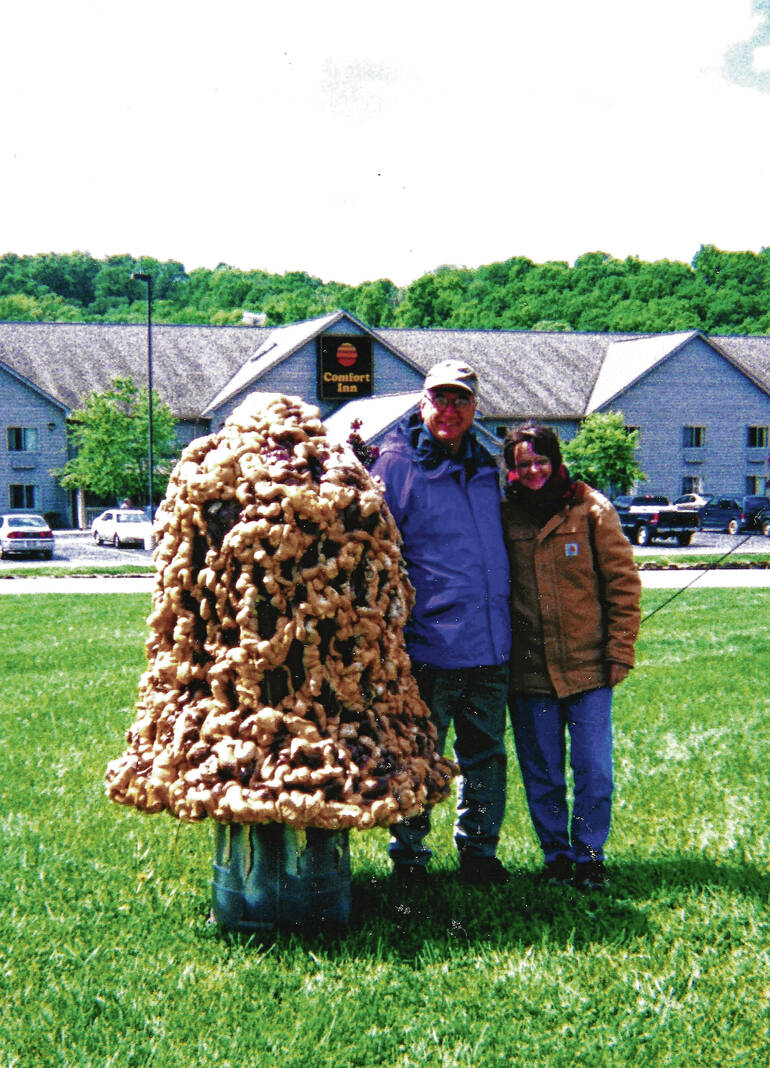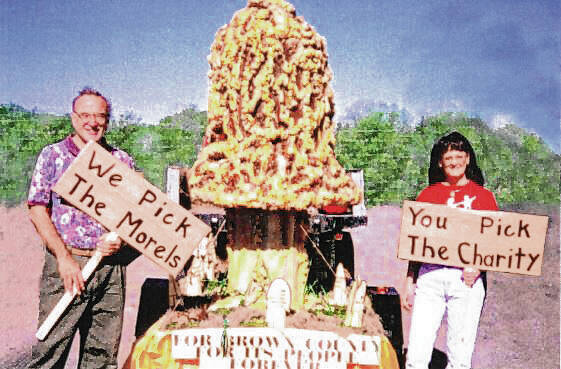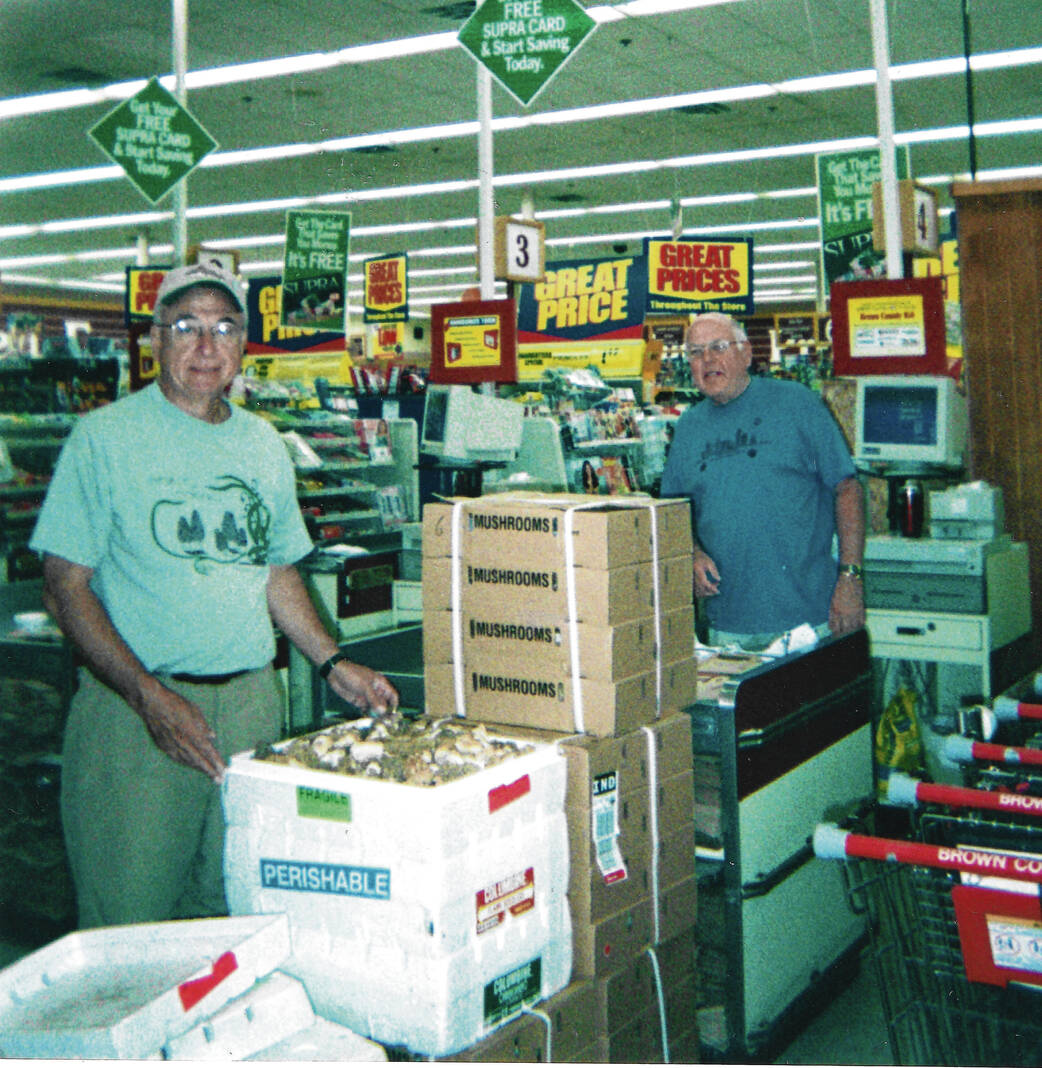
Mortimer the Morel, Howard Hughes and Marcia Flaherty Likens pose at the morel sale in 2000. The sale is in its 25th year and will be this weekend at the Brown County IGA.
Submitted | Marcia Likens

Howard Hughes, left, and Marcia Flaherty Likens pose with their morel mushroom sale float in the Spring Blossom Parade in 1998. The sale is in its 25th year and will be this weekend at the Brown County IGA.
Submitted | Marcia Likens

Howard Hughes, left, and Jerry Simo weigh morel mushrooms at the Brown County IGA in 2005. Around 200 pounds of morels have been sold in the past. This year, about 500 pounds will be sold, with about 400 pounds already spoken for in pre-sales.
Submitted | Marcia Likens
As spring rains subside, temperatures rise and the sun shines through the clouds, many find themselves walking with their heads down and eyes on the ground hoping to find morel mushrooms.
Lucky ones have their sacred mushroom hunting spots and secrets to the sport while others may not.
If you find yourself in the latter crowd, don’t worry — you can still get your hands on the seasonal woodland treat all while supporting local organizations.
The 25th annual Howard Hughes Memorial Mushroom Sale is set for this weekend at the Brown County IGA with all proceeds benefiting a nonprofit of the buyer’s choice.
‘So much good’
Howard Hughes passed in December 2011, but his spirit of giving has lived on through donations from his estate and will continue to do so through several permanent endowments at the Brown County Community Foundation.
The sale is one facet of his lasting legacy of philanthropy.
He believed philanthropy was a civic responsibility and enjoyed giving back while encouraging his community to do the same. Often Hughes would provide grants with a matching component, meaning he would match any donation made to a nonprofit or organization in the community.
Hughes did not grow up in Brown County, but he considered the hills his home.
Hughes and long-time local Bob Kirlin were good friends through the Brown County Rotary Club.
Kirlin said he did not help start the sale, but helped work it for a number of years. After Hughes passed in 2011, there was a get together of his friends and family at the Seasons Lodge and Conference Center.
At that time, Kirlin said he stood up to say “As long as I was alive there’d be a Howard Hughes mushroom sale.”
“That’s what’s happened,” Kirlin reflected last week. “My involvement is keeping the memory of Howard Hughes alive in this community. He did so much good.”
With the help of the Brown County YMCA and local volunteers, the sale has continued for a quarter of a century.
Like any good mushroom hunter, Hughes never told anyone where the mushrooms came from for the sale. As years progressed, Kirlin said they found out Hughes was driving to Michigan — or even Wisconsin or Minnesota — to pick them up.
In those days it was about 200 pounds of mushrooms. This year, they will pick up 500 pounds.
“Since then it’s become so huge that we’re going to go over 500 pounds this year. It’s a great thing for nonprofits,” Kirlin said.
As customers arrive to the sale, they purchase their mushrooms (whether pre-ordered or walk-up) and write down which local nonprofit they’d like their sale to benefit, hence the sale’s tagline: “We pick the morels and you pick the charity.”
The Brown County Community Foundation distributes the funds accordingly following the sale.
Those working the sale serve in two-hour shifts and are representatives for different nonprofits that can benefit from the sale. Those volunteers also get a cut of the sale, the money going back into their organization.
There is not a list of how many nonprofits will benefit since purchasers can choose, said BCCF Chief Executive Officer Maddison Miller.
“For that reason, we do not know how many local nonprofits will benefit until after the event has concluded,” she said.
“The morel sale is an opportunity for our community to reflect on Howard Hughes’ legacy of service to Brown County while continuing his tradition of innovative philanthropy,” Miller continued.
“Not only can you purchase delicious mushrooms for a great cause, it’s an opportunity to interact with local nonprofits and community leaders working the tent. Beyond learning about their great work, you might even pick up a tasty recipe or two. “
The past 25 years, the sale has raised approximately $62,000 for local organizations, Kirlin said.
Shirley Boardman and Kim Robinson are co-chairs of the sale and have been the “driving force” behind it since Kirlin turned over the reigns to them almost 10 years ago, he said.
“At the time I didn’t know what a morel mushroom was,” Boardman said. “I knew that it was an important part of our community. … The morel mushroom seems to carry an intriguing mystique for Brown County.”
Another important part of the community was Hughes’ legacy, Boardman said.
“For me it was, at the time, honoring Howard’s legacy and the fact this was a really unique event for Brown County,” she said. “It was for charity and I’ve been deeply involved in charity work in Brown County.”
Boardman is secretary of the board for St. Vincent de Paul.
For a number of years sales came from Midwest mushrooms. With unpredictable weather and seasons, Boardman said local mushrooms come and go before the sale on Memorial Day weekend. They now come from the Pacific Northwest.
“Mushrooms there grow in higher elevations,” she said. “As the snow melts and goes up the mountain, new seasons of mushrooms generate themselves. They get mushrooms well into June, generous amounts available for the Memorial Day sale.”
Mushrooms aren’t the only out-of-state aspects to the sale. Boardman said that though it’s a Brown County “unique” sale, buyers come from as far as Tennessee and Michigan for a chance to buy morels.
Boardman said that the Brown County Humane Society is the top nonprofit of choice each year, “hands down.”
The cost for morels is $60 per pound and $30 per half-pound.
Robinson said that the sale is a great way for different organizations to come together and meet.
Robinson said the sale is also just fun.
“It’s a lot of fun, to sit outside and see people who have been coming for 10 years,” she said.
“It’s a great way for different organizations to earn a little extra cash. It’s nice to be out in the public, meet people and promote your cause.”
The history
Hughes came up with the idea in 1996: a fundraiser — sponsored by no one in particular — staffed by volunteers who don’t know when they’ll be needed and the monies going to whatever Brown County nonprofit the customers chose.
Marcia Flaherty Likens is a friend of Hughes and is his estate executor. She said the idea wasn’t initially well-received.
“Undeterred, he continued his research and found a ‘Morel Broker’ who loved the concept,” she said. “‘Mariam’ said she would set aside morels for him, but he would have to come immediately upon her call to pick them up.”
After organizing volunteers, the sale was underway in May of 1997.
“Volunteers would be like Minutemen, they needed to be ready to act once Howard received a call from his broker that the morels had been coming in strong, and he should ‘head up here,’” she said.
Hughes, using his own money, put several thousand dollars in the glove box of his truck and hit the road at 6 a.m. for the 28-hour round trip drive to the broker’s location — which Likens said is still a secret.
“He traveled up during the day, and homeward at night when the temperatures were cool. It was important to keep the morels fresh, or he was out the money,” she said.
Hughes would arrive in Brown County early in morning and former IGA owner John Davis allowed them to store the morels in the store’s walk-in cooler and to use the register scales to weigh and bag the mushrooms. The sale has always taken place in the IGA parking lot.
The first sale was a success, with more than 200 pounds sold out early the second day of the three-day sale.
Over the next couple of years, the community began to get excited about the sale, constantly asking when the sale would be, Likens said.
“Naturally, he couldn’t tell them. Mother Nature has her own schedule,” she said.
Restaurants then began to get involved, putting morel dishes on their menus and the Brown County State Park even started a festival.
“Howard truly enjoyed the energy around the sale,” she said.
Over the years, he kept asking for more morels than Mariam could provide and every sale was turning into a one-day event, Likens said.
In 2003 sale facilitators met the “World’s Number One Morel Mushroom Expert,” the late Larry Lonik who authored of “Basically Morels,” Likens said.
His advice and contacts turned the morel sale into a much easier operation, she said.
“We could choose the date for the sale. We would just tell a new broker when and how many pounds of morels we needed. Morels would be flown into the Indianapolis airport from wherever they were most plentiful. Regardless of where the morels were from, in morel hunter tradition, Howard never revealed that information. If a customer said ‘Are these Michigan morels?’ Howard said ‘Yes,’” Likens said.
After Likens left Brown County in 2005, Hughes had volunteers step in to take care of the details she had always handled.
“Brown Countians can always be counted on to help,” she said. “The passion of the community for this particular fundraiser is extraordinary.”

